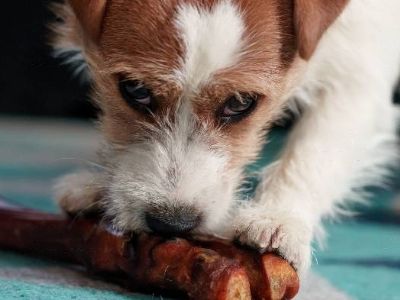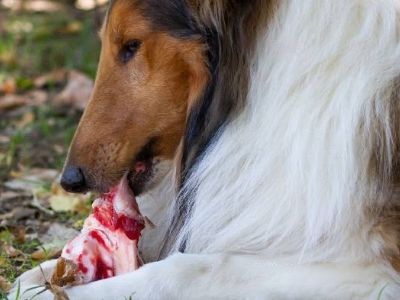This article is addressing a common question among dog owners- Can dogs eat cooked lamb bones? But, before we glide into the details of this question it’s important to ask Can dogs eat lamb bones at all? The answer is yes, they can eat raw lamb bones but, cannot have cooked lamb bones. Let’s find out why.
Can Dogs Eat Cooked Lamb Bones?
No, dogs cannot eat cooked lamb bones. Even if the cooked bones, or leftover bone scraps from the plate, are baked, boiled, steamed, fried or smoked, they are troublesome for your canine friend for many reasons.
Once the bones are cooked, the collagen and nutrients are leached from the bone, leaving a bone that was relatively soft and flexible now breakable. Should a cooked bone be chewed on by an eager dog, it is easy for it to crack into uneven pieces. These pieces can result in choking.
Further, such pieces of bones can also cause some fatal injuries and internal damage such as:
- Mouth injuries, such as bone splinters piercing their tongue & gums
- Broken teeth
- Obstructions induced by the pieces of the bone becoming stuck in the oesophagus, trachea or intestines
- Bone pieces can cause constipation
- Internal bleeding if they manage to penetrate internal organs
- Cause a bacterial infection (Peritonitis) in the abdomen that can happen when bone fragments penetrate the stomach or intestines
- Pancreatitis (high-fat content)
What if your dog ends up eating a cooked bone?

In a scenario, where the dog ends up eating a cooked bone, it’s important you don’t panic. Look for the following signs or issues your dog might have:
- Vomiting
- Gagging or coughing
- Lethargy
- Pushing to defecate
- Excessive thirst
- Licking their lips
- Unable to sit comfortably
- Pacing anxiously
If your dog is exhibiting any of the signs listed above, it may indicate an injury from consuming a cooked bone. The probability of injury also relies on the size and shape of the bone gobbled by your furry friend. In addition, if your furry friend has ingested a cooked bone, then we strongly recommend seeking vet treatment instantly.
Afterwards, it is important to stay alert and pay attention to your dog over the next few days to make sure the bone passes. If the bone doesn’t pass and your dog is finding it tough to defecate or there’s blood in their stool, or their stomach appears to be swelling, or vomiting, or appears anxious, visit your vet directly.
Just like dogs should not be given cooked lamb bones, crab sticks are another human food that should be avoided. For more information about crab sticks, check our guide, “can dogs have crab sticks“.
Can Dogs Eat Raw Lamb Bones?
Yes, dogs can eat raw lamb bones. In fact, it’s more suitable in comparison to cooked lamb bones for dogs. Now before we get into the specifics of why dogs can have raw lamb bones, let’s have a quick glance at the types of bones for dogs and which type raw lamb bone fits in.

Types of bones
There are two types of bones for dogs, edibles and chewable.
- Edibles: are the ones that actually supply nutritional value to your dog. Chicken or turkey are examples. But, sadly you can’t give this to your furry friend. They’re too soft and small. The best you can do to offer such bones is to grind them up in a blender and add them to their food. It provides some extra vitamins and minerals.
- Chewables: or recreational bones are the ones that are not meant to be completely eaten. They’re for the fun activity of chewing and a treat for your dog. The pieces here are the legs bones or hips. Such pieces are hard to break and will last for hours. Raw lamb bones are the chewable type.
Feeding raw lamb bone to the dogs
You can feed raw lamb bones, however, they may contain bacteria which can not only harm your canine friend but, your entire family. Hence, it’s important you prepare the raw lamb bone treat for the dog considering the following aspects:
- Purchase fresh products, buy from a local butcher for better quality
- Kill the bacteria by freeing bones in separate portions
- Thaw the ones before feeding them to the dog otherwise they may end up cracking their teeth
Further, there are some simple practices to make raw lamb bones safe for dogs. To offer your dog a raw bone, you can follow these tips to safely feed your dog raw lamb bones:
#1 Proper-sized bone
Always remember that the lamb bone is for chewing. So, it’s crucial to make sure that the size of the bone is not small. Otherwise, the dog will easily gobble down the bone and it can cause some fatal issues.
For ensuring that the size is not too small, you can pick one that’s larger than the size of your dog’s muzzle. Doing so will help you stop the dog from ingesting and perhaps choking on the bone. In addition, keep the bone free of sharp edges as they might cut your dog’s tongue.
#2 Clean bones
A dog’s stomach acids help in digesting the bones and remove possible bacteria in raw food. Regardless, raw meat still poses a health risk for many dogs, especially for puppies and dogs with autoimmune conditions. Animal fat often causes gastrointestinal upset and can lead to pancreatitis, or inflammation of the pancreas so, cut any fat or skin from raw bones.
#3 Give the dog frequent breaks while chewing
Continuous chewing can bruise dogs’ mouths. To avoid such a situation, take the bone away from the dog after 15-20 minutes. Also, never leave your dog alone with the raw lamb bone for a longer period of time. Because the longer the bone remains out the room temperature it gets softer or may even begin to rot which can cause issues for the dog.
#4 Prevent your dog from burying the bone
Often dogs can obsess over the piece of bone. You have to supervise them while they chew the raw lamb bone and make sure they don’t bury the bone. Burying the bone will allow bacteria to settle on the bone and when your dog does get it out, chewing such bone will result in an infection or other health issues.
Just like dogs should not be given cooked lamb bones, foods like bacon need to be fed to dogs sparingly and in small amounts. Check our guide,”can dogs eat bacon” for more information.
Benefits Of Raw Lamb Bones
If you manage the quantity let’s say around 1-2 Raw lamb bones a week, it can provide some useful benefits to your dogs. Here are some of the benefits:
- Lamb bones retain omega-3 fatty acids and anti-inflammatory properties
- They have a high presence of calcium and phosphorus
- The chewing activity keeps them engaged preventing boredom and also improving dental health
- Prevents serious health conditions like Bloat or known as Gastric dilatation-volvulus (GDC). In this condition, a deep-chested dog’s stomach twists over itself and raw bones can help in making the stomach strong to avoid GDC.
As mentioned at the beginning of this section, raw lamb bones can only benefit if they are served in the proper amounts. If you serve more, then it will lead to different health issues for your dogs.
Disadvantages Of Feeding Raw Lamb Bones
- Can cause nutritional imbalance
Yes, raw Lamb bones can provide your dogs with some necessary nutrients. But, if your dog is eating a commercial kibble diet or a commercial wet food diet, then it’s already receiving the accurate balance of nutrients.
Hence, giving them raw lamb bones can upset their routine and create a nutritional imbalance.
- Dental problems
It may seem contradictory, but, these raw lamb bones can cause some serious dental issues for your dog, especially if they have weak teeth.
The raw bones such as thigh bones, shanks, shoulder bones, etc that we offer to the dog are very thick and hard, such. These bones can lead to chipped or broken teeth. This is a painful experience and mandates veterinary assistance.
In addition, dental problems don’t just include broken teeth. Sharp pieces of bone can puncture or scrape the inside of your dog’s mouth, also small pieces of bones can get stuck between teeth, and much more.
- Internal blockage and injuries
Unlike cooked lamb bones, raw ones are likely to splinter but, it still can happen. Especially if your dog is chewing the bone for longer periods. So, while chewing if the pieces do break off then they are likely to consume them.
The pieces are sharp and small that they can choke your dog. In addition, if they swallow these pieces they can cut through different internal organs and this can turn into a life-threatening catastrophe.
- Bacterial infection
Raw bones always pose a significant threat to bacterial infection. Dogs can suffer some serious infections from the bacteria present on the surface of the bone. So, not just your canine friend, but, the family members are also at risk of getting an infection if they come in contact with the dog.
Have you ever considered giving your dog prawns? Check our guide “can dogs eat cooked prawns” for feeding tips.
FAQs
Can puppies eat cooked lamb bones?
Cooked lamb bones are not recommended. If you have to feed your puppy a bone, you can feed him raw lamb ribs, lamb shanks, or tail bones.
Are cooked lamb bones ok for dogs?
Lamb bones may provide some benefits to your dog’s health, but it’s never safe to deliver cooked bones to dogs. If your dogs end up eating a cooked lamb bone piece, it can instantly turn into a choking and dental hazard.
What to do if my dog has eaten a cooked lamb bone?
If your furry friend ingests a cooked bone then it’s recommended you seek veterinary treatment instantly. Any delay in doing so may have severe repercussions. Also, after the treatment is done, it is important to monitor your dog’s behaviour and make sure that over the next few days, the ingested bone passes through their stool.
Conclusion
So, can dogs eat cooked lamb bone? – No. Dogs eating cooked lamb bones are prone to serious health problems such as choking, dental issues, bacterial infection and so on. You can serve them raw bones. They have many benefits but also have some risks.
However, many vets are completely against feeding bones to dogs. So, when you decide on giving raw lamb bones to your dog make sure you consult with the vet.



